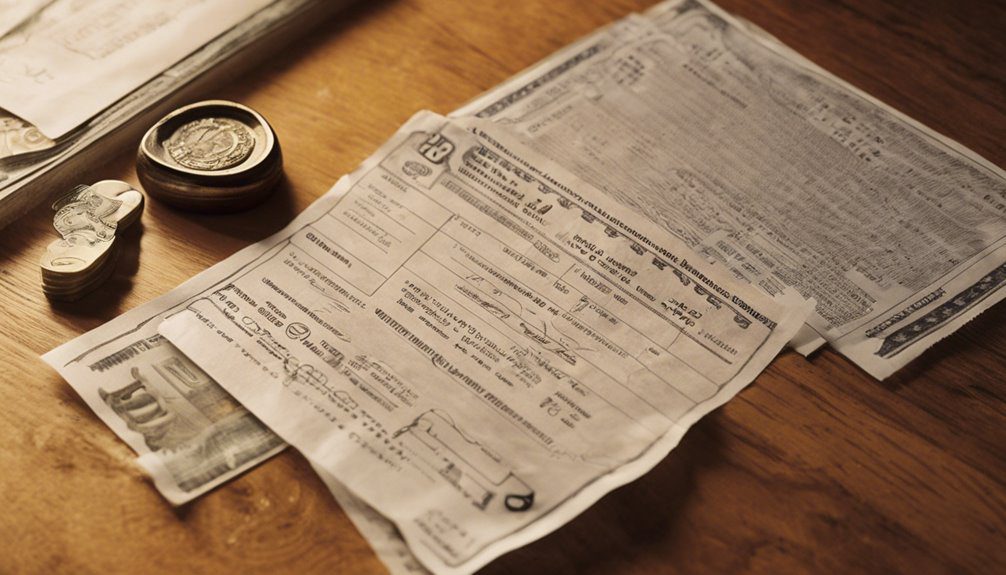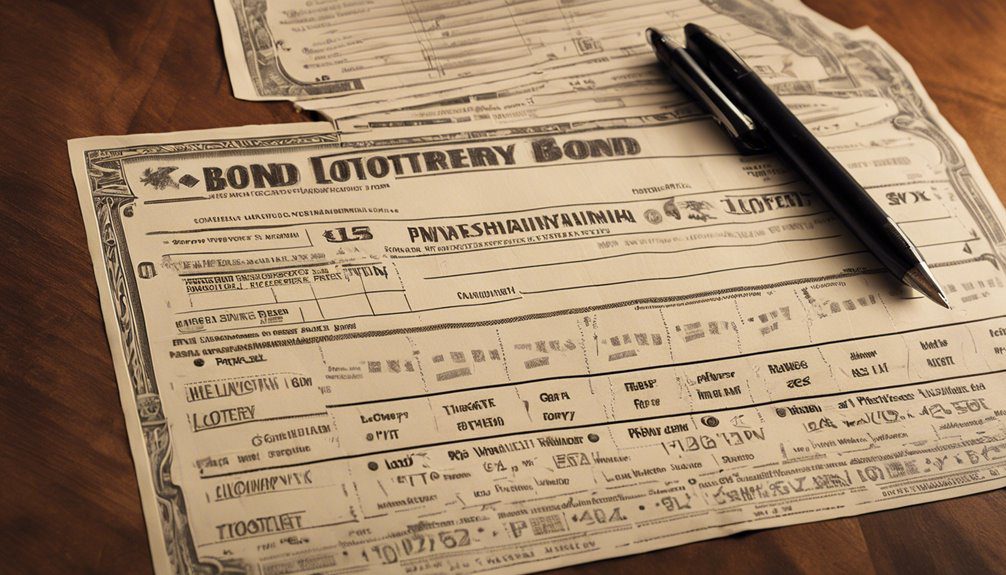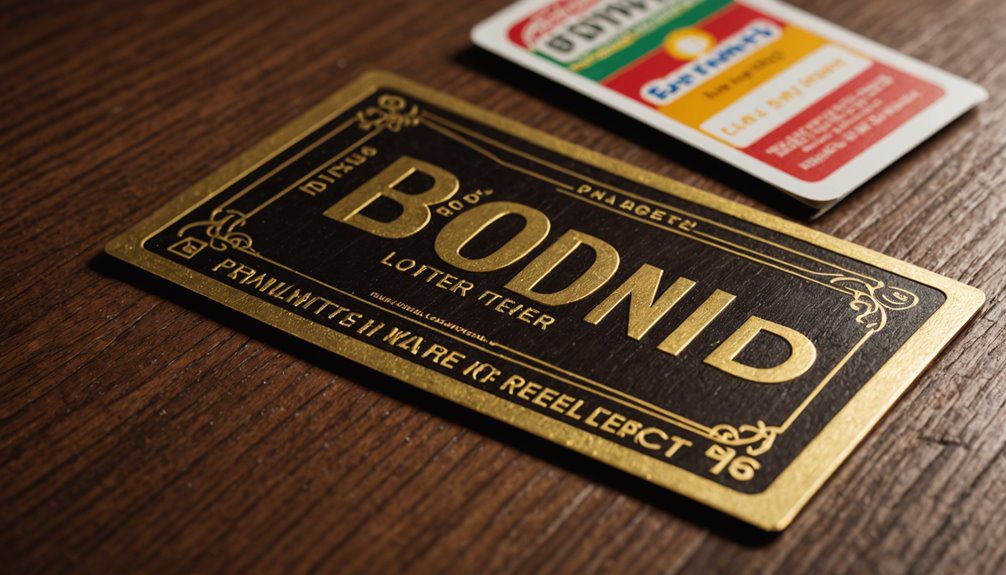If you're considering becoming a Pennsylvania Lottery retailer, understanding the significance of the Lottery Retailer Bond is essential. This bond not only assures compliance with state regulations but also safeguards both the state and consumers against potential fraud. You'll need to meet specific requirements and undergo a credit assessment, but that's just the beginning. The costs can vary, and knowing the ins and outs could make a significant difference in your application process. So, what exactly do you need to ensure you're on the right track? Let's explore that further.
What Is a Retailer Bond?

A retailer bond is a type of surety bond that ensures compliance with state regulations for businesses selling lottery tickets. When you decide to sell lottery tickets in Pennsylvania, obtaining this bond becomes a crucial step in your operations. It acts as a safeguard for both the state and consumers, helping to guarantee that you'll adhere to all applicable laws and regulations.
Essentially, this bond provides financial protection to the state and the public if you fail to fulfill your obligations, such as paying taxes or remitting ticket sales. If you breach these terms, the bond can cover any losses incurred by the state or your customers. This means that securing a retailer bond also enhances your credibility as a business owner, showing that you're committed to operating legally and ethically.
To obtain a retailer bond, you'll need to go through a bonding company that will assess your financial stability and business practices. Additionally, the costs of lottery bonds may vary based on your credit score profile, which can influence the premium you pay for the bond. Once approved, you'll pay a premium for the bond, which can vary based on your creditworthiness.
Importance of the Bond
Why is a retailer bond so crucial for your lottery ticket-selling business? This bond serves as a safety net, protecting both you and your customers. If you fail to adhere to state regulations or engage in fraudulent activities, the bond provides financial compensation to those affected. This reassurance can significantly enhance your reputation, attracting more customers who trust your business.
Moreover, having a retailer bond is often a requirement to operate as a lottery retailer. Without it, you could lose the ability to sell tickets, directly impacting your revenue. A bond demonstrates your commitment to ethical practices, which can help foster strong relationships with state authorities and customers alike.
Additionally, the bond can help shield you from potential legal issues. If a dispute arises, the bond can cover damages, allowing you to focus on running your business rather than dealing with legal battles. Furthermore, debt consolidator bonds are similar in nature, as they also protect consumers and enhance trust in financial services.
Requirements for Obtaining the Bond

To secure a Pennsylvania Lottery retailer bond, you'll need to meet specific requirements set by the state. First, you must be a licensed retailer authorized to sell lottery tickets in Pennsylvania. This means you've already gone through the necessary application process for a lottery sales license.
Next, you'll need to provide a bond amount that meets the state's minimum requirements, which typically varies based on your projected sales volume. You'll also have to select a surety company that's licensed to operate in Pennsylvania. They'll assess your financial stability and creditworthiness before issuing the bond.
Additionally, you may need to submit personal financial statements or business documentation to prove your ability to meet your obligations. Expect to complete a bond application, providing accurate information about your business operations and owners.
Lastly, be ready to pay a premium for the bond, which is usually a percentage of the total bond amount. Meeting these requirements ensures you can successfully obtain your Pennsylvania Lottery retailer bond and operate your lottery retail business legally and responsibly. Moreover, understanding local ordinances is crucial for ensuring compliance with the bond approval process.
Application Process Overview
Navigating the application process for a Pennsylvania Lottery retailer bond can seem daunting, but breaking it down into manageable steps makes it easier.
First, you'll need to gather all necessary documents, such as your business license, identification, and financial statements. This ensures you have everything at hand when you start the application.
Next, you'll want to choose a surety company that's authorized to issue Pennsylvania Lottery bonds. Research different providers to find one that fits your needs and offers competitive terms.
Once you've selected a surety, submit your application along with the required documents. The surety company will review your application and may ask for additional information.
After your application is processed, you might need to undergo a credit check. This helps the surety assess your risk level.
If approved, you'll receive a quote for the bond premium. Review this quote carefully before moving forward.
Finally, once you pay the premium, the bond will be issued. You'll then submit it to the Pennsylvania Lottery as part of your retailer application.
Following these steps will help streamline the process and get you on your way to becoming a retailer.
Costs Associated With the Bond

When considering a Pennsylvania Lottery retailer bond, it's essential to understand the costs involved. The primary expense you'll face is the premium paid to the surety company, which typically ranges between 1% to 3% of the bond amount. This percentage depends on factors like your credit score, financial history, and the specific bond amount required by the state.
In addition to the premium, you might encounter other costs, such as application fees charged by the surety company or additional documentation fees. If you have a lower credit score, be prepared for potentially higher premiums, as the surety may view you as a higher risk.
Moreover, some sureties might require collateral or a personal guarantee, adding to your overall costs. It's crucial to shop around and compare quotes from different surety companies to ensure you're getting the best deal.
Lastly, remember that while the initial costs are important, you should also consider the long-term financial implications of maintaining the bond. Understanding these costs will help you budget effectively and make informed decisions about your lottery retailer bond. Additionally, be aware that the bonding process for contractors can vary significantly based on your region and the specific requirements set by the state.
Renewal and Maintenance
After securing your Pennsylvania Lottery retailer bond, you'll need to think about renewal and maintenance to keep your business compliant. The bond typically has a specified term, often one year, so you'll want to note the expiration date.
It's crucial to initiate the renewal process well in advance to avoid any lapses. Maintaining your bond means ensuring you meet all necessary requirements set by the Pennsylvania Lottery. This includes staying up-to-date on any changes to regulations or laws that might affect your status as a retailer.
Regularly review your bond terms to make sure you're aware of any conditions that could impact your compliance. You should also keep in close contact with your bonding company. If anything changes in your business, such as ownership or financial situation, inform them right away.
They can guide you through any adjustments needed for your bond. Lastly, remember to keep all documentation related to your bond organized and accessible. This won't only help you during the renewal process but also ensure you're prepared if any questions arise. Surety bonds act as a financial safety net for all parties involved in your business operations.
Keeping your bond active and compliant is essential for your continued success as a Pennsylvania Lottery retailer.
Consequences of Non-Compliance

Failing to comply with the requirements of your Pennsylvania Lottery retailer bond can lead to serious repercussions for your business. If you neglect your bond obligations, the Pennsylvania Lottery can suspend or revoke your retail license. This means you won't be able to sell lottery tickets, significantly impacting your revenue.
Moreover, non-compliance can result in financial penalties. You could face fines that can add up quickly, putting additional strain on your finances. If a claim is made against your bond due to your non-compliance, you'll be responsible for repaying any amounts paid out, which can further jeopardize your business's stability.
Additionally, your reputation in the community and with your customers could suffer. Trust is crucial in retail, and any hint of dishonesty or instability can drive customers away. You may also find it challenging to secure future business partnerships or loans, as lenders typically view compliance issues as red flags.
In short, staying compliant with your Pennsylvania Lottery retailer bond is essential. The consequences of non-compliance can be detrimental, affecting your finances, reputation, and overall ability to operate your business successfully.
Tips for Prospective Retailers
One crucial tip for prospective Pennsylvania Lottery retailers is to thoroughly understand the bond requirements before applying. This bond acts as a safety net, ensuring compliance with state regulations.
Familiarizing yourself with the specific amount required and the conditions of the bond will save you time and potential headaches down the line.
Another important step is to conduct market research in your area. Knowing your competition and understanding your target audience can significantly enhance your chances of success.
It's essential to assess the demand for lottery products in your location.
Don't overlook the importance of a solid business plan. A well-structured plan will guide your operations and help you set realistic goals.
Additionally, you should ensure that your location meets all necessary zoning regulations for selling lottery tickets.
Finally, build a good relationship with the Pennsylvania Lottery Commission. Stay informed about any changes in regulations and actively engage with them.
This proactive approach can provide you with valuable insights and help you navigate the complexities of being a retailer.
Conclusion
In conclusion, securing a Pennsylvania Lottery Retailer Bond is essential for your success in selling lottery tickets. This bond not only helps you comply with state regulations but also builds trust with your customers. By understanding the requirements, costs, and application process, you can navigate the journey smoothly. Remember, staying compliant is key to maintaining your ability to sell lottery tickets and protecting your business's reputation. So, take the necessary steps and secure your bond today!


